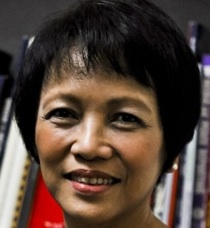SUMMARY
This is AI generated summarization, which may have errors. For context, always refer to the full article.
 What happens when a ranking member of the judiciary is tainted by new revelations about his past?
What happens when a ranking member of the judiciary is tainted by new revelations about his past?
This is not a hypothetical case. It’s for real.
Justice Danton Bueser of the Court of Appeals, a former congressman of Laguna, is among the legislators identified by the Commission on Audit as having given part of their pork to dubious NGOs. Before he was appointed to the appellate court in 2009, he served in Congress for 9 years.
According to the COA special report on PDAF covering the years 2007 to 2009, Bueser forked out P9.6 million to the Philippine Environment and Economic Development Association (PEEDA) and another P9.8 million to the Aaron Foundation Philippines. That’s almost P20 million of people’s money, a tiny amount compared to Senators Bong Revilla’s, Jinggoy Estrada’s and Juan Ponce Enrile’s hundreds of millions in kickbacks but, as we all know, that’s hardly the point.
Bueser coursed these through the Technology Resource Center, the GOCC that has become notorious for being the conduit to Napoles NGOs and other questionable networks. TRC was among the GOCCs that cornered the biggest chunks of lawmakers’ PDAF from 2007 to 2009.
Both of Bueser’s PDAF releases, the COA report said, had “unliquidated balances.” But the worst part is: these NGOs did not exist.
The COA pointed out that PEEDA was among those NGOs that either submitted unverified list of beneficiaries or had listed beneficiaries who denied transacting with them or submitted fake receipts and other questionable documents.
Aaron Foundation’s office in Gagalangin, Tondo turned out to be a vacant lot, storing equipment of the Maynilad Water Services.
Forged signatures?
Bueser denied to the COA that he had dealings with these NGOs. In a press statement, he said that his signatures were forged, joining the ranks of Senators Revilla and Ferdinand “Bongbong” Marcos who claimed the same defense. Bueser added that he would ask the National Bureau of Investigation to look into these documents.
TRC head Dennis Cunanan, however, said in his affidavit that he checked the signatures of the lawmakers his office dealt with, specifically Revilla, and they were confirmed to be genuine. It was standard operating procedure to validate endorsements letters and signatures, he pointed out.
Bueser has inhibited himself from cases involving Napoles although these 2 NGOs are not at all connected with the country’s most famous prisoner. They appear to be part of rival con NGOs which also targeted congressmen’s pork.
We have not heard anything from the Supreme Court about Bueser and if it intends to pursue its own probe. The COA has provided solid leads. A little more legwork and verification should give a full picture.
In the case of the alleged influence peddler and fixer Ma’am Arlene, the justices formed a committee, chaired by Justice Marvic Leonen, to get to the bottom of this scandal. And all it took was a series of news reports.
Back to the JBC
The judiciary need not be saddled with judges and justices whose controversial or sullied past catches up with them. But this can only happen if those who are appointed to the posts are thoroughly vetted and the selection process is insulated from lobbyists and politics.
I have written much about the screening of judges and justices (perhaps obsessively so) because this is where the original sin begins. The task of ferreting out the good and honest candidates belongs to the Judicial and Bar Council (JBC).
But the JBC, supervised by the Supreme Court, is also part of the old-boys’ club. It has not yet become truly independent and fearless in making its choices. Lobbying still prevails, both in the JBC and in the Office of the President.
Once the candidates make it to the judiciary, the court administrator, ideally, sees to it that they do not engage in hanky-panky, that they all live up to their oath to serve with integrity. But as we have seen, this appears not to be a priority.
A few years ago, I spoke at a forum with court administrator Midas Marquez before some members of the business community. Someone in the audience asked him about corruption in the courts and what was being done to reduce this.
He related an anecdote about a litigant who informed him of a judge who accepted bribes. Scared for his case, which was pending before this judge, the litigant did not execute an affidavit. What did Marquez do? He said he made inquiries and didn’t find much.
His reply surprised me because he could have done more. He could have talked to the judge and impressed on him that he was being watched. He could have started a discreet probe. Under Chief Justice Maria Lourdes Sereno, he should be able to do all these if he really believes in cleaning up the judiciary.
When Sereno was applying for the Supreme Court in 2010, I watched her public interview. I remember distinctly her answer to then Chief Justice Renato Corona’s question on how to rid the judiciary of “hoodlums in robes.”
“Entrapment is one method,” Sereno said, “but first, there should be a clear signal from the leadership for reform.” She elaborated: funds would be needed for investigating corrupt judges and justices; entrapment could be outsourced; sophisticated bribe attempts should be cracked; as confidential map of “players” should be documented; and all these should be under the supervision of the Chief Justice.
Now, Sereno can do all these. – Rappler.com
Add a comment
How does this make you feel?
There are no comments yet. Add your comment to start the conversation.